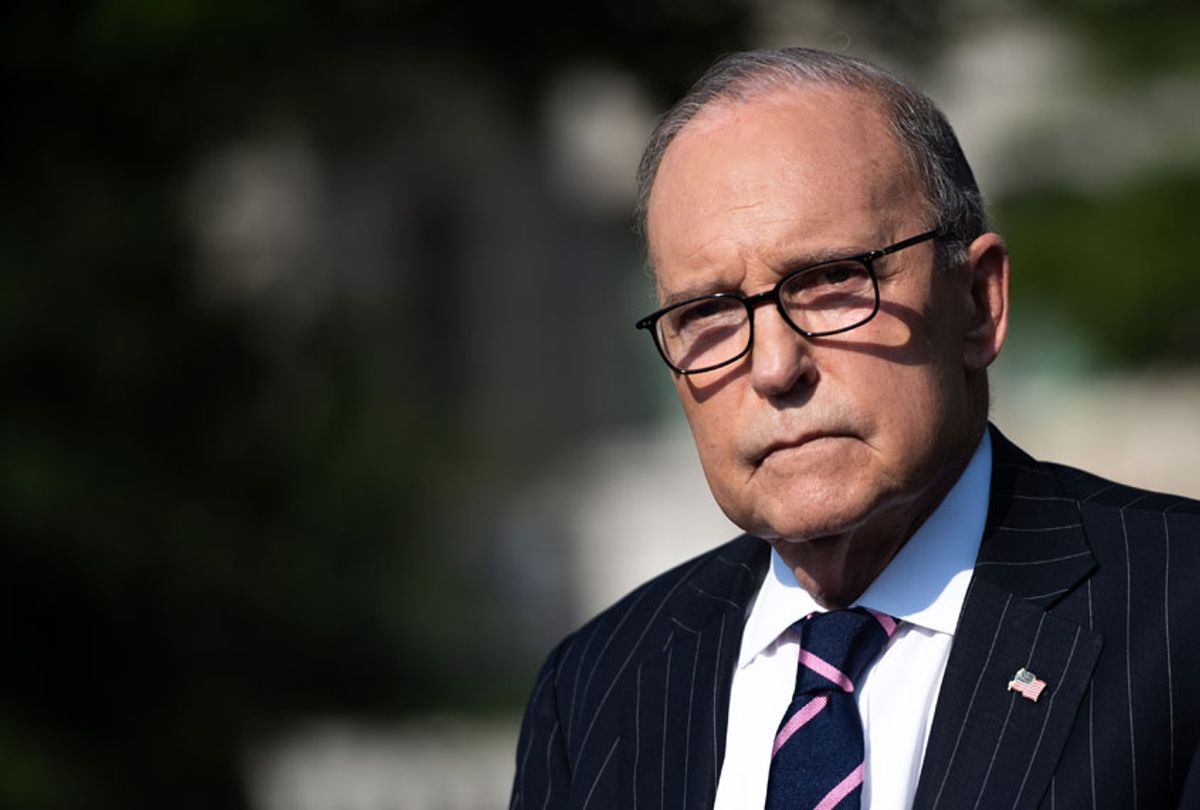President Donald Trump's top economic adviser on Sunday vowed to allow federal unemployment benefits to expire in July as he pushed a narrative which Treasury Secretary Steven Mnuchin had refuted days earlier.
Kudlow, a millionaire former Wall Street analyst who worked at CNBC before being tapped as the director of the National Economic Council, argued that the $600 additional weekly benefits were a "disincentive" to work.
"I mean, we're paying people not to work. It's better than their salaries would get," he told CNN's Jake Tapper. "That might have worked for the first couple of months. It'll end in late July."
Kudlow said the Trump administration would instead create a "reform measure" that would provide some sort of incentive to work, though one that would be less generous.
"It will not be as large, and it will create an incentive to work," he said. "That goes along with the other incentives we've generated, the tax rebates and most particularly . . . the Payroll Protection Program, which I think was a huge success."
Tapper pressed Kudlow on his claim that unemployment benefits were a disincentive, noting that many Americans want to return to work but jobs are not coming back.
"I think that's a fair point. I personally agree with you. I think people want to go back to work. I think they welcome the reopening of the economy. I think they're anxious to get out and about," Kudlow replied. "However, at the margin, incentives do matter. We have heard from business after business, industry after industry and there's already some evidence that this effect is taking place."
Kudlow's comments on CNN were contradicted by Mnuchin's Wednesday testimony to the Senate Small Business and Entrepreneurship Committee. Some Republicans on the committee pushed the same narrative as Kudlow, arguing that the payments were a disincentive. But the Treasury secretary said there was no evidence of this trend.
"I think we've seen from the recent numbers that didn't have a big impact because people want their jobs," he testified.
But Mnuchin had no answers when asked what the administration would do to address the needs of more than 40 million Americans laid off amid the pandemic.
"We will have a significant amount of unemployment, and we're going to have to look at doing something there," he said.
Republican lawmakers have called for a similar plan as Kudlow. Sen. Rob Portman, R-Ohio, who sits on the Finance Committee, proposed giving Americans who return to work a $450 weekly bonus.
Rep. Kevin Brady, R-Texas, the author of the 2017 Republican tax cut bill, proposed a one-time $1,200 payment for those who return to work.
Economists said it was a big mistake to end unemployment aid.
"This is exactly backwards, like stopping an antibiotic prematurely because you start to feel better," former Treasury Department economist Ernie Tedeschi tweeted after a slightly better-than-expected May jobs report. "This is the first jobs report to reflect our fiscal response at full capacity. If we let support expire too soon, we could have a double-dip downturn."
"It is imperative that policymakers do not take this as a sign that it's time to stop providing necessary relief to workers, their families, and state and local governments," Elise Gould, a senior economist at the Economic Policy Institute, agreed. "The economic pain will be long-standing without additional aid."
House Democrats included an extension of the benefits in the $3 trillion bill the chamber approved last month, but Republicans immediately rejected the proposal. Senate Democrats hope they can convince their Republican colleagues that letting the aid expire would hurt reopening efforts.
"My view is you don't take your foot off the gas right now," Sen. Ron Wyden, D-Ore., the top Democrat on the Senate Finance Committee, told reporters last week. "If millions of Americans lose their supercharged benefits and are unable to pay their bills, the economy is not going to be in a position to rebound."



Shares